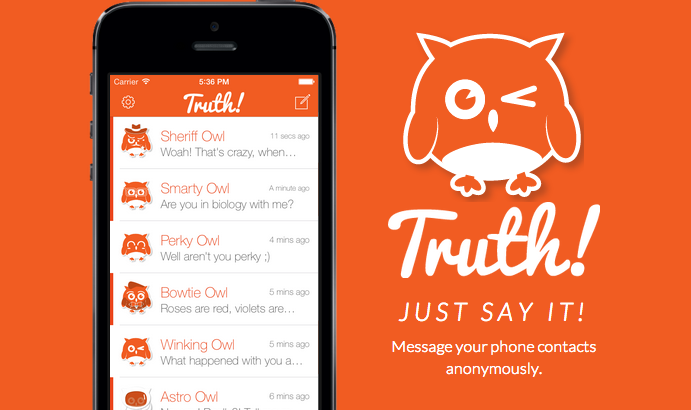
With Whisper and Secret raising millions of dollars to build anonymous services, all kinds of apps are popping up that let you share things without attaching your identity.
While most of the apps emerging try to build a community by letting you scroll through streams of anonymous messages, some developers are creating apps that let you reach out directly to people in your contacts.
There seems to be some latent demand for these kinds of services. Leak, a service for anonymously emailing people, recently launched and shut down in a manner of days due to the combination of a huge influx of people trying it out and the fact that it was quickly built on platforms not intended for that use.
Over the last few days I’ve been playing with Truth, a similar app for iOS that lets you send anonymous text messages to people in your phone’s contacts.
The interface is a close facsimile of Apple’s default Messages app, so there isn’t much of a learning curve. There is a bit of friction to get started with the app, however: besides the expected popups asking for permission to access your contacts, Truth also makes you register with an email address and password.
That doesn’t seem like it should be a necessary step, considering the point is that the app in anonymous and it confirms that you’re actually using your phone number with a text verification. I asked Ali Saheli, one of the creators of the app, why it requires that step. He told me via email that credentials are being collected so that they can be used in an unannounced upcoming “part of [their] platform.”
Protip: if collecting an email address isn’t needed for the primary function of your app and you can’t tell users exactly what it will be used for, just don’t.
That quibble with the setup process aside, Truth works as advertised. You can choose any contact in your address book to send an anonymous text, and in several tests, messages arrive in about as much time as they would via a regular text. Messages begin with “The truth is” by default, which is meant to inspire compliments or hard truths that might be too awkward to express openly.
If you send a message to someone who has also installed Truth, it’ll show up in their app with an anonymized identity. If the chosen recipient hasn’t used the app — which is far more likely — they’ll get a text from a Bay Area phone number that they haven’t seen before.
My biggest concern with Truth is that, like other anonymous apps, the service seems easy to abuse. Most of the screenshots Truth uses to market the app suggest that it’ll be used for flirting, which would be fine except for the fact that receiving messages isn’t opt-in. Considering how often flirty behavior can turn into unwanted advances in situations where identities are known, I have a feeling that quite a few people who receive messages from Truth before installing the app will end up blocking its number.